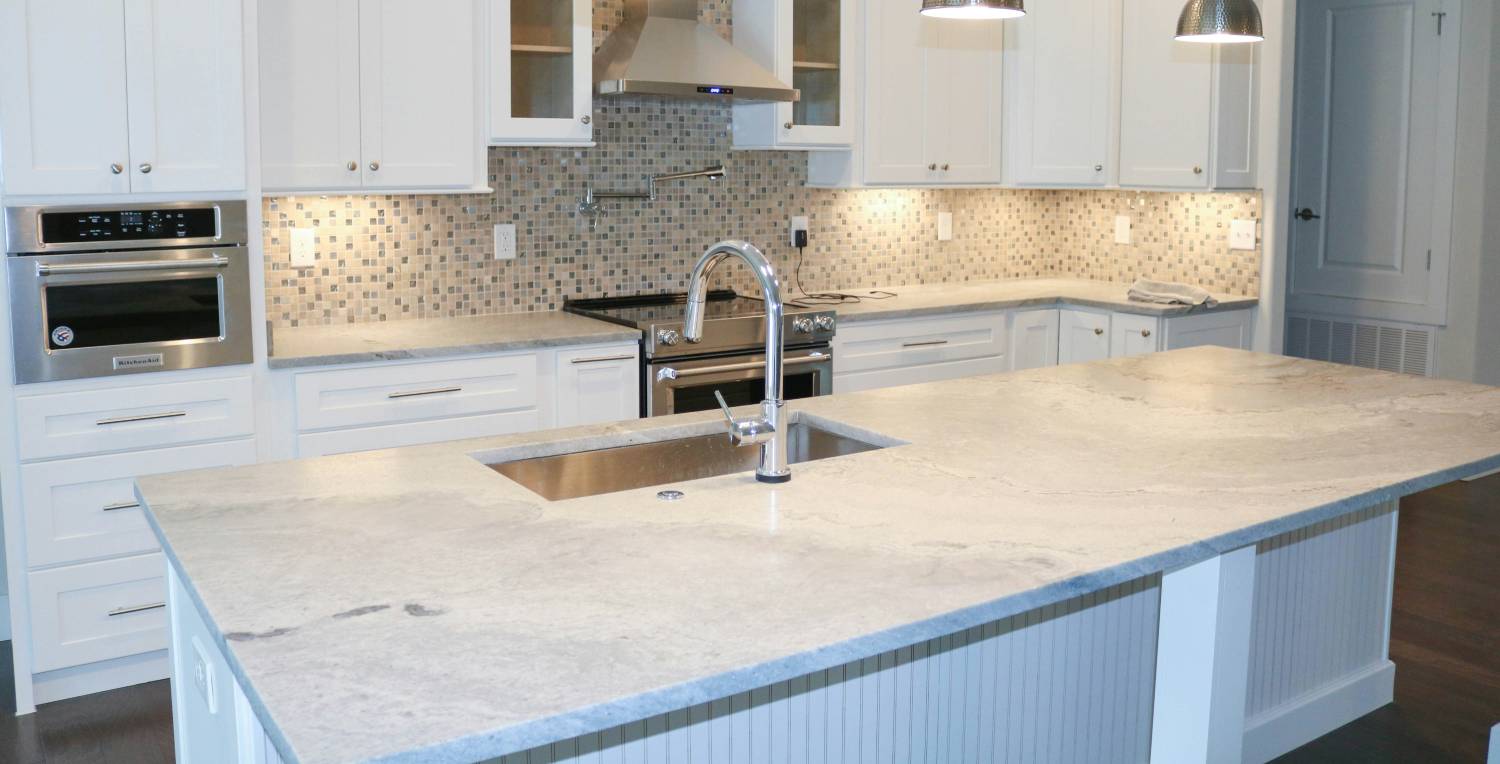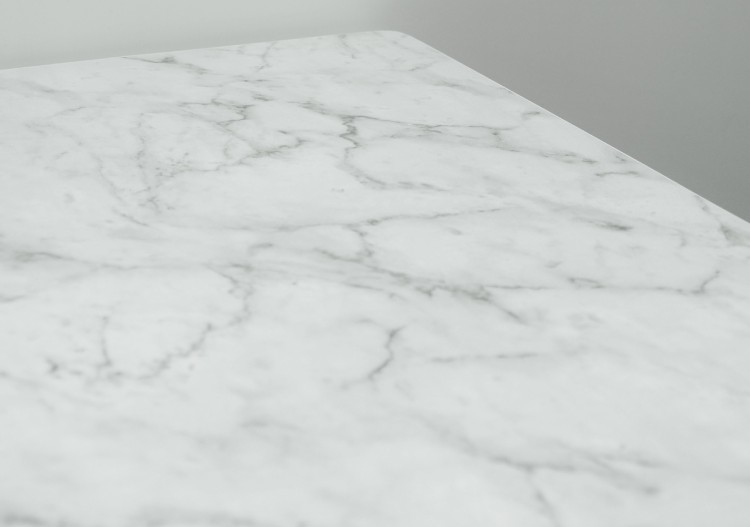The porcelain slab is gaining popularity as one of the top benchtop materials in Australia. It has been continuously stepping up its game of becoming an excellent natural and engineered stone alternative.
Porcelain countertops are a good choice if you want something durable than laminate but not as costly or heavy as quartz, porcelain might be a good choice. If you plan to install a new porcelain benchtop, we’ve created a comprehensive guide to help you determine the advantages and disadvantages of affixing this material in your busy culinary space.
What Is Porcelain?
Porcelain is typically used for bathroom coating and ceramic pottery since it is an ultra-compact or sintered compact surface made of ceramic slabs with high density and low porosity.
This material has changed the game when it comes to kitchen resurfacing because of its superior qualities that exceed the distinct attributes of quartz-based stones.
How Are Porcelain Slabs Manufactured?
Porcelain slabs are made from bonded powdered clay and coloured pigments under intense pressure and temperature.
Utilising fine particles creates distinct surface textures, from a polished, smooth appearance to a textured, uneven surface. The result is a high-quality porcelain countertop.
During manufacturing, various designs are printed on the slab surface to imitate a wide array of materials, such as natural stones, concrete, wood, and more.
The Pros of Installing Porcelain Benchtops
These sleek porcelain slabs in Sydney, with unique textures and amazing printed designs imitating various materials, not only enhance your kitchen’s aesthetics but also offer a wide array of advantages, such as:
Excellent Design Variety
While other kitchen benchtop materials offer limited design options, porcelain provides an endless collection of unique colours, designs, and patterns.
It will be easier to look for the hue, pattern, and style that perfectly complements your kitchen’s interior.
Whether you want a sleek, modern look or a chic marble-like elegance, you can personalise your space and elevate your aesthetics by choosing your desired porcelain design.
Various Finishes
Porcelain surfaces come in various finishes that can complement different style preferences and improve kitchen functionality. Some common porcelain finishes include:
Matte. A honed porcelain surface that is subdued and non-reflective can create a chic and sophisticated look in your busy space. It minimises the glare, resulting in a more muted and modern style.
Polished. This finish showcases a sleek, glossy surface resembling classy natural stones like marble. The smooth and lustrous finish is an excellent choice to create a bold and luminous ambience in your culinary space.
Glossy. The reflective nature of this finish can make your small kitchen look more prominent, making the room look more spacious and lighter.
Natural. Copying the look of its natural alternatives, such as stone and wood, is what natural finish is all about. This finish provides an earthy and timeless style that can elevate your interior design, whether used as a countertop or backsplash.
Textured. This unique porcelain finish showcases tactile components that add more personality and depth to the material, crafting a dynamic surface that is visually captivating.
Lappato. A versatile finish that combines the elements of matte and gloss that results in a semi- polished porcelain surface with a subtle shine defines the lappato finish.
Customisable Sizes
Kitchen benchtops come in different styles and sizes. With their distinct forms, you need porcelain slabs that suit the design and size of your countertops.
Whether you have a waterfall kitchen island or the traditional L-shaped benchtop, the versatility in sizing allows you to achieve the perfect fit, ensuring a seamless installation of slabs in your stunning porcelain countertop.
Durable
Porcelain takes pride in its durability. It is crafted by mixing fine clay, kaolin, and other materials and firing them at extremely high temperatures.
Its intricate manufacturing process contributes to its intense durability, non-porosity, and hardness. Whether you use porcelain as kitchen benchtops or wall cladding, you can ensure longevity because it can resist scratches heat, and stains.
It is also non-porous, guaranteeing its functionality and maintaining its beauty regardless of the water splashed onto its surface due to cooking and meal preparations.
No Sealing Required
Unlike its natural stone alternative, which you need to seal regularly to preserve its strength, porcelain slabs in Australia don’t need constant sealing maintenance because of their inherent durability and resiliency.
Once the slabs are installed in your kitchen, they can maintain their strength without needing frequent resealing, which makes them more functional and low maintenance.
Versatile
Porcelain is remarkably versatile. This material can be installed indoors and outdoors, showcasing their versatility and adaptability to different setups.
You can also choose from its wide array of styles, patterns, and finishes and use it as a kitchen benchtop, backsplash, bathroom flooring, or wall cladding to complement the design of your space.
 The Cons of Installing Porcelain Benchtops
The Cons of Installing Porcelain Benchtops
While a porcelain slab has a wide array of excellent qualities, knowing the drawbacks of installing it in your kitchen is essential to determine if it is the best material that can cater to the daily demands of your culinary space.
Heavy and Brittle
The hardness of porcelain can be its triumph, but it can also lead to its downfall since it can make the material extremely heavy and brittle.
When installed as a benchtop, you must ensure that the foundation and kitchen cabinet can support its weight to prevent mishaps. You must also be meticulous when installing porcelain because it may break or shatter if mishandled.
If the porcelain slab sizes and weight are too big, customise it to make it thinner or add a panel to ensure a secure and fit benchtop.
Superficial Beauty
When natural stone materials are cut, the inherent beauty visible on the surface can also be seen in its core.
With porcelain slabs in Sydney, the design and patterns are only printed on top of the material; they don’t extend to their entirety. When you cut porcelain into slabs, you can’t find any design on its inner part.
However, porcelain manufacturers overcame this disadvantage by perfecting its inner colour to harmonise with the top design, maintaining its stylish qualities.
Challenging to Repair
The complexity of porcelain’s composition makes it difficult to repair its pristine structure and design.
While you can perform a band-aid solution on the chipped edge of your porcelain slab bathroom or kitchen counters by repairing it using resin, the result will never be ideally close to its pristine shape.
If the damage on your porcelain benchtops is irreparable, you must replace the surface to restore its beauty and functionality.
In Conclusion
Porcelain is an excellent material that can significantly elevate your culinary space. But consider its exceptional qualities and minor drawbacks before installing it in your kitchen to ensure it fits your needs, expectations, and lifestyle.
Elevate Your Kitchen Counters with Porcelain
Opt for the unconventional kitchen benchtop material by choosing the intricate and exceptional alternative: porcelain. Give your kitchen a more stunning look and vibe, and make it more functional than ever with porcelain.
And, for your porcelain and benchtop installation needs in Melbourne, you can turn to Stone Interiors. We offer premium stone materials and expert benchtop installation services. Get in touch with us today by contacting (03) 9357 0096.




 The Cons of Installing Porcelain Benchtops
The Cons of Installing Porcelain Benchtops